Anthony Bourdain shows up at El Bulli and the place is abuzz. Despite the fact the staff represented over 20 different nations, every cook there knew of him. But what was he doing here? After all, he had trashed the restaurant in his book Kitchen Confidential.
I am taken to the chef’s table with the other American stagier for introductions. Chef Bourdin leans in to me and asks," How did you get this job at El Bulli?"
His amazement at my placement in El Bulli as a stagier the summer of 2003 confirmed my own incredulity. And every day I came back to the same question.
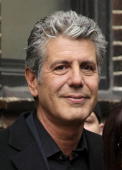
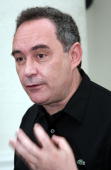
How I got a Stage at El Bulli.
After a fellowship at the CIA, I traveled through Madrid, Sevilla and Barcelona studying Spanish for half the year. I returned to NYC only to find that my 15 years in foodservice and my fresh diploma from the CIA merited a mere $125 shift pay at some of Manhattan’s finest restaurants. Forlorn and still unemployed, I related this to my friend from Cadaquez. Perhaps I’d like to work in Spain?, he suggested. He had a friend who was a cook at some local restaurant. The “local restaurant” was El Bulli and his friend wasn’t a mere cook, but the sous chef. I submitted my CV and was accepted shortly thereafter for the summer stage.
Why me? I can’t be certain. I had worked for Martha Stewart and several notable places in NYC and Philadelphia. But I believe it was my teaching fellowship position at the CIA that was most recognizable credential on my resume. However, there was little doubt my friend-of-a-friend contact cemented my entry. I was to return to Spain late May to work through the month of June.
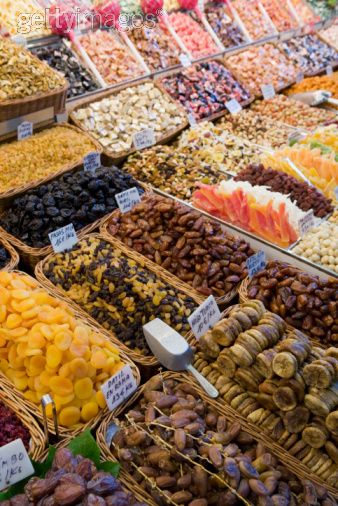
My family thought I was insane. “You’re going to Spain to work for free?” asked my parents. They didn’t understand my motivation (and willingness to go into debt) until coincidentally, Ferran AdriÓ’s picture graced the
cover of the New York Times Magazine the following August.
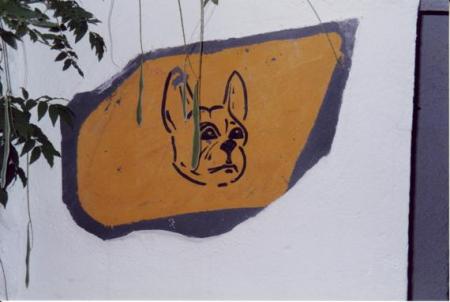
An American Chef in Spain
The menacing stories of American-trained chefs in Europe proved true for me: long working hours, a goodly amount of abuse and a whole lot of “yes chef’s.” The workday starting at noon, we would often work until 2 in the morning.
There was an army of us stagiers—over 40 in total. Few were placed in special areas of the kitchen, but the majority followed a traditional tournade schedule. It was a tremendous opportunity to work in all areas of the kitchen. The traditional areas of El Bulli’s kitchen is blurred. “Garde Mangier” for example, doesn’t translate to Adria’s kitchen. Just the same, I worked at least 5 different stations, from what I’ll call the “gel” station to desserts. By far, the prep kitchen was the most difficult. Often, ten of us would spend upwards of three hours prepping fresh pine nuts for only four VIP customers.
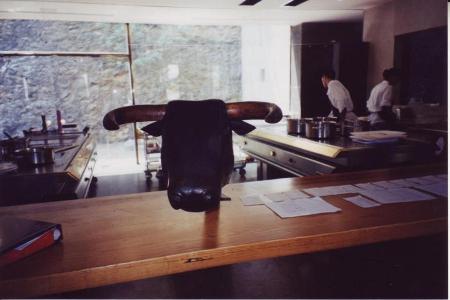
Every stagier was younger, had impressive credentials, as well as Michelin-rated ambitions. Motivated beyond my comprehension, these young cooks were going to become big names in the culinary industry. They had a timeline and a schedule; first Paris, then Tokyo, Spain, then perhaps New York City. Multilingual, most of the stagiers spoke at least three languages.
My Spanish language skills were good, but having to content with Catalan as well as the Spanish accents of the Japanese, Hungarian and Brazilian stagiers was no easy feat. Perhaps it helped that there was NO chatter in the kitchen, only the uninterrupted concentration needed to implement the vision of Chef AdriÓ. The only word heard audibly was “quemo”, which literally means “burnt” but can be translated as “behind you” or “coming through—hot.” On occasion, one stagier would spontaneously shout "Quemo!” for no reason at all, if but to hear his own voice.
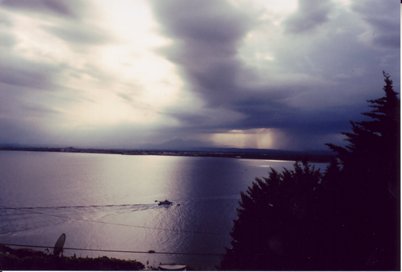
Down Time.
The workday was arduous, but all my personal time was spent in preparation for the 12+ hours a day in the kitchen. I walked a mile and a half in terrific heat each morning only to wait at the side of the road with the other stagiers for the lucky chance someone would give us a ride to work. Everyone hitchhiked the secluded, curvy roads trailing the seaside cliffs to the restaurant. Getting home was always a matter of charity and the few who owned cars were forced to drive the majority of us home. Then, at three in the morning when I was safely home, I would start on laundry to have clean whites to wear later that week. Even sleep gave me no respite, waking nightly with painful leg cramps or nightmares that I was an adult with the language skills of a two-year-old.

Aftermath.
And I come back to the same question Chef Bourdain asked—how DID I get this job at El Bulli? I don’t think I am more talented or committed than many cooks out there. Certainly, we have all worked long, hard hours only to turn around and do the same thing over again. Who of us have not made sacrifices for our careers at the expense of our social lives and income?
And despite my previous experience, I was not versed in the magic of “molecular gastronomy” nor did my time at El Bulli teach me a great deal about its science. In fact, rarely were we privy to AdriÓ's recipes; the concoctions that created such dishes as the apple caviar and the spaghetti carbonara (and dishes too numerous to list) were often prepared for us in advance by the few permanent staff at the restaurant. We stagiers were simply the willing technicians implementing a plate’s final outcome. I, like the rest of us here in the United States had to wait until his cookbook El Bulli 2003-2004 came out to make the selfsame recipes I “prepared” while I was in Spain. I have actually learned more about his methods since I returned.
(Recently, I watched Bourdain’s informative and entertaining DVD “Decoding Ferran AdriÓ” which he was filming while I was there. Numerous plates were brought to his table, some of which I’d never seen—even though I was in the background, within camera frame.)
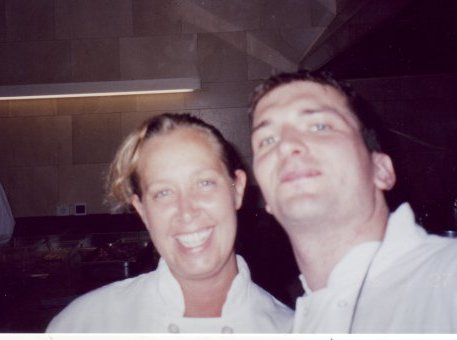
I am not special, but given a very special opportunity. I walk away most proud of myself for having taken chances: professionally and personally. (After all, I could have traveled all the way to a remote area on the Costa Brava only to be informed they weren’t in need of me.) From developing my Spanish language skills to hitchiking in unfamiliar territories, I found myself in new and strange situations every day.
Certainly, the food and techniques employed by Chef AdriÓ has shaken many out of their culinary slumber and forced many to re-evaluate what food is and what can be found at the center of the plate. In the end, it’s all about taking risks. And you don’t have to travel to Spain for that.